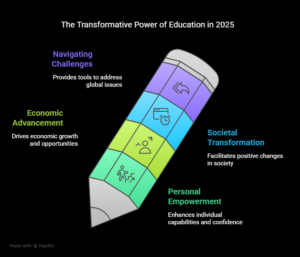Discover the top 20 benefits of education in 2025, from personal growth to global progress, and understand why learning is more vital than ever.
Introduction
The reason why in 2025, education matters more than anything else in life. Education is the strongest means to personal empowerment, economic growth, and community change in 2025. In a world riddled with challenges, ranging from technological disruptions to climate change, education empowers people with the understanding and knowledge necessary to navigate and tackle these problems. In 2025, education is an indispensable part of building a better future and in this article, we will present the 20 most important benefits of education in 2025.

1: Enhanced Career Opportunities
A diverse range of career opportunities are beyond the doors that education opens. The following sectors are booming as of 2025, creating millions of jobs for skilled professionals: technology, healthcare, and renewable energy. Good education nurtures the skills and knowledge needed to succeed within these worlds.
2: Increased Earning Potential
It is a well-documented statistical fact that people with additional education attain higher lifetime earnings. We see this trend repeated in 2025, where advanced degrees and specialized certification will earn you the highest-paying jobs across the board. Education is a great investment, and we know this.
3: Grow from the experience and learn
Education promotes personal development through the development of critical thinking, creativity, and problem-solving. As we approach 2025, more and more education systems are realising that learning should not only make students knowledgeable but also cater to the emotional quotient of the person so the learning outputs are adaptable to this truly unprecedented change.
4: Better health and wellness
Education is highly correlated with health outcomes. Education is positively associated with health behaviors, use of medical care, and longevity. Back in 2025, education remained a major factor in public health and wellbeing.
5: Economic Growth and Stability
Economic development requires an educated workforce. The year is 2025, and people in countries with a higher level of higher education are beginning to see crazy growth in their economy, and the educated population is gaining momentum in core sectors like technology, finance, healthcare, etc. That is why education is the cornerstone of innovation and productivity hence a stabilizer of economy.
6: Social Mobility and Equality
Education is one strong instrument for social mobility, bringing individuals from a disadvantaged background to new socio-economic levels. Equal access to quality education is closing gaps and increasing social equality in 2025.
7: Reduction of Poverty
Education plays a major role in the sustainability of breaking poverty. By 2025 more multinationals are benefiting from investment incentives that address access to education, as the flows of economic advantage are starting to mean improved outcomes for individuals and communities and lower poverty levels.
8: Women and Marginalized Groups Empowerment
Education offers women, alongside underprivileged groups in general, a way to excel due to the knowledge and skills that help them partake in economic, social, and political life as equals. Growing focus toward inclusive education establishing gender equality and social inclusion by 2025.
9: Advance of Peace and Stability
Thus, more educated societies tend to solve their conflicts peacefully, contribute their parts to a better global community and harmonious world. By 2025, education continues to be fundamental to a peaceful and prosperous society as it promotes understanding, tolerance and solidarity between different nations and cultures. brainfeedmagazine.com
10: Environmental Awareness and Sustainability
It educates people about the causes of environmental challenges and motivates them to take a sustainable approach. It is now 2025, and sustainability-focused educational programs have empowered individuals to make choices that benefit the health of the planet.
11: Technological Literacy
Technology literacy is critical in the digital age. Over the years, education systems have reformed their curriculum with a key focus on digital as everyone wants their students to be prepared for the future workforces by 2025. It covers code writing, analytical capabilities, and responsible technology usage.
12: Skills such as critical thinking and problem solving
Education nurtures critical thinking and problem-solving abilities. By 2025, skills like these are becoming more crucial to learn to help students deal with the complex challenges they will face when they get into the real world, whether it is in science, technology or even social issues.
13: Citizenship Involvement and Task
With a higher incidence of participating in civic activities, voting, and contributing positively to their communities, the potential positive effects of an educated population is far-reaching. It is now 2025, and education imparts civic responsibility and civic engagement and inspires active engagement in the democratic process.
14: Enhanced Communication Skills
But being able to communicate effectively is key, both professionally and socially. Schools are also focusing on things like writing; readable and effective digital communication, or even speaking — whether that’s in-person or on video, like creating an introductory video to be shared with future teachers or employers — making communication the most valuable area of most education systems in 2025.
15: Adaptability to Change
Flexibility has become very important as we live in a world where change is a constant. Education is all about adaptability: lifelong learning and overcoming adversity in 2025.
16: A Worldly and Culturally Informed Point of View
Education tailors perspectives and helps familiarization of cultural varieties. By 2025 the focus has shifted to education with an emphasis on globalization and preparing the students for the interconnected world.
17: Innovation and Creativity
Education seeks to cultivate innovation and creativity through exploration and experimentation. Teaching creativity occupies an increasingly prominent place in educational institutions in 2025, as schools recognize that cultivating this feature is a key requirement for future success, both in the domain of technology and in art.
18:Information and Resource Accessibility
Education opens up a world of information and tools that can better their lives. The tech we have is making education accessible to more, meaning anyone can learn, wherever they are in 2025.


